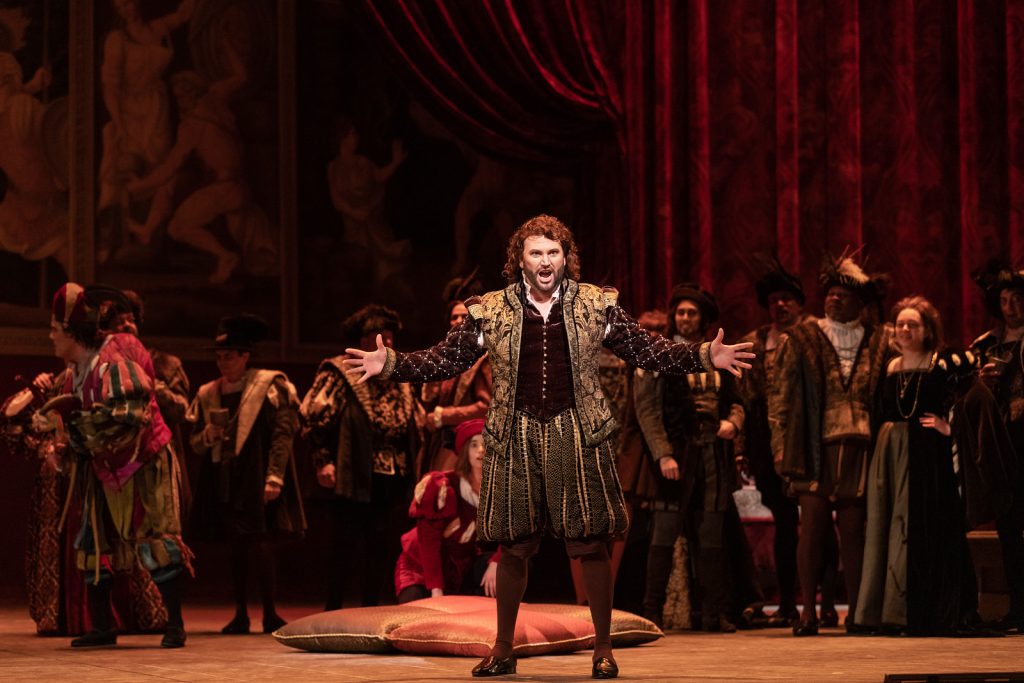Gilda Steals the Show in San Diego Opera’s “Rigoletto”
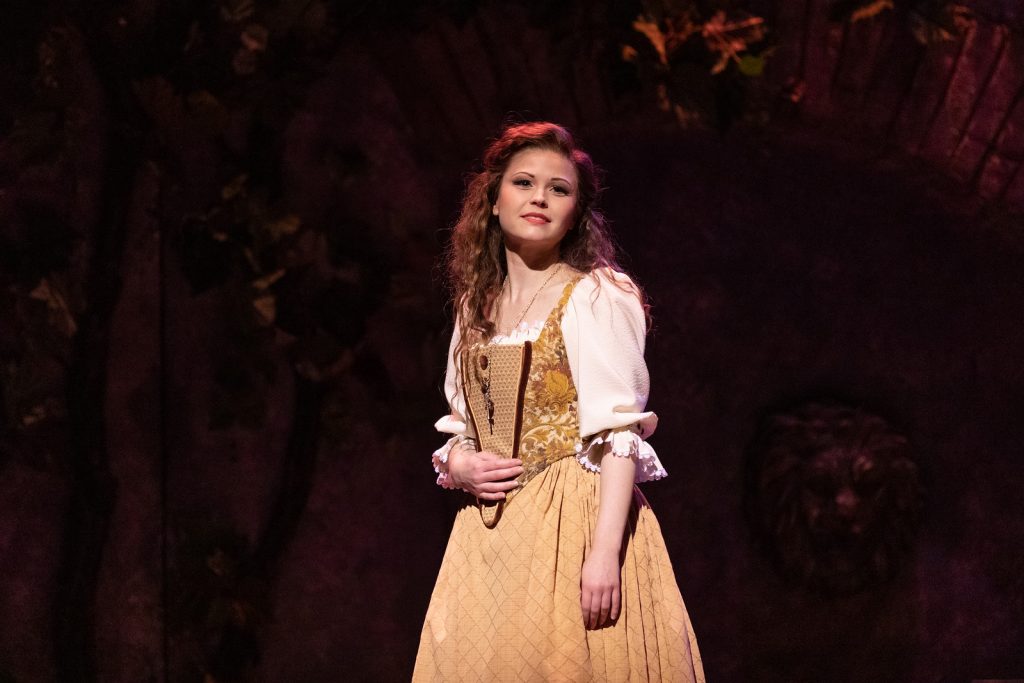
Soprano Alisa Jordheim is Gilda in San Diego Opera’s RIGOLETTO. February, 2019. Photo by Karli Cadel.
RIGOLETTO
by Giuseppe Verdi
The plot of Verdi’s Rigoletto may seem ridiculous to today’s audiences, but given a few contemporary tweaks, it could easily serve as an episode of Dateline NBC, that long-running crime show in which innocent women so often meet with incredibly baroque demises, usually at the hands of their murderous spouses. I can just imagine host Lester Holt tempting us with the lurid details of how the body of a beautiful young girl was discovered in a potato sack abandoned on the banks of a river. Poor little Gilda! How could it happen?
In Verdi’s immortal melodramma fashioned by his librettist Francesco Maria Piave from the play Le roi s’amuse (“The King Amuses Himself”) by Victor Hugo, Gilda is stabbed to death by an assassin hired by her own father, Rigoletto, the court jester to the libertine Duke of Mantua. It’s the kind of awful twist we expect on Dateline. Rigoletto had intended to murder the Duke because this serial rapist had “abused” (as they say these days) his daughter. Regrettably, Gilda succumbs to the Duke of Mantua Syndrome and falls in love with her abductor. He is, of course, entirely unworthy of her adoration, but she disguises herself as a young man seeking shelter from a thunderstorm and wanders right into the knife originally intended for the Duke himself.
What a Dateline installment could never hope to achieve is the depth of pathos Verdi and Piave bring to this tale. Rigoletto chafes mightily at the decadence and immorality of the court whose libertine ways he has enabled. And the opera brilliantly reveals the complexity of his character. He is an adoring father; he is profoundly superstitious, terrified by another father’s curse; and he is burning with a desire for vengeance. The opera is really his tragedy — although in San Diego last night, Gilda stole the show.
Soprano Alisa Jordheim is perfect for the role of Gilda. She looks small and vulnerable when surrounded by her fellow cast members and the chorus, and her coloratura flights are dazzling. The showcase aria “Caro nome” (“Beloved name”) fits her like a glove. I believe this is the first time she has sung the role on stage and it was a triumph for her.
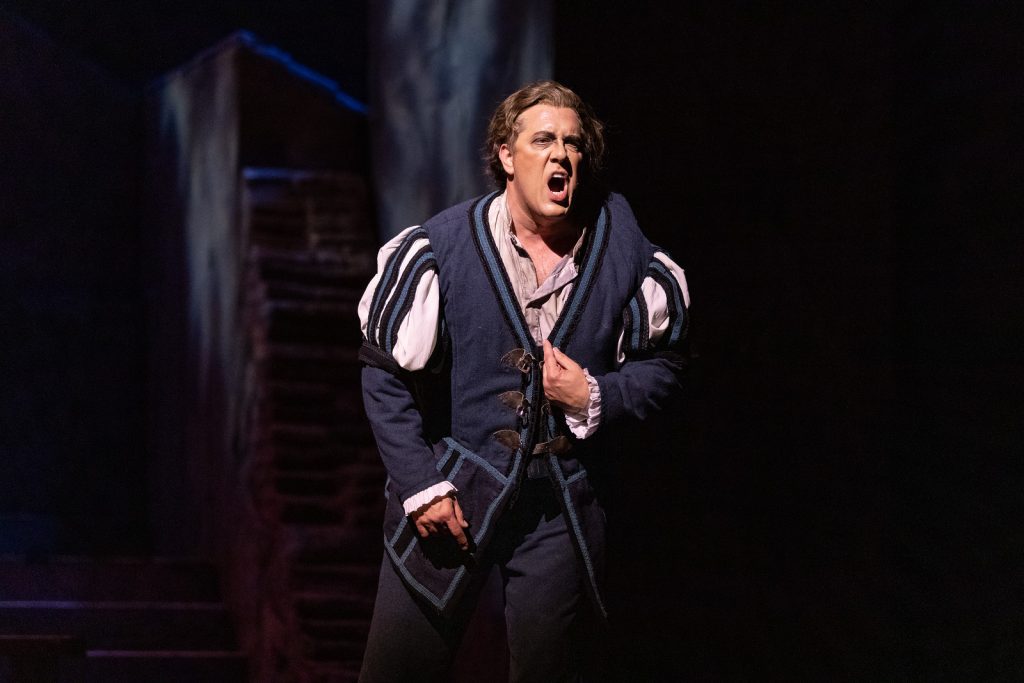
Baritone Stephen Powell is Rigoletto in San Diego Opera’s RIGOLETTO. February, 2019. Photo by Karli Cadel.
Baritone Stephen Powell was wonderful with Jordheim in the father/daughter duets, and elsewhere in the opera he offered up consistently excellent vocalism — although the histrionics went in and out of focus, a fault I attribute largely to the stage director Michael Cavanagh and orchestra conductor Steven White. Also unfortunate was the indisposition of tenor Scott Quinn who, despite excellent diction, brought little excitement to the role of the Duke. This is a shame if only because he has the opera’s hit tune, “La donna è mobile” (“Women are fickle’), that was — quite remarkably — a non-event last night.
As the evening wore on, White’s flaccid conducting sapped the score of dramatic urgency. The music wandered casually into the opera’s most memorable moments. Here we are at “Si! Vendetta, temenda vendetta!” Just another stop on the bus route — as was “Questa o quella,” and “Parmi siamo!” It must have been difficult for baritone Powell to get up steam after we had been wandering around so indifferently for some time. I don’t know whose business it is these days to scream out “Pep things up, dammit!” in rehearsal. I have actually seen the famous quartet that begins “Bella figlia dell’amore” encored because it was so exciting. Last night it just sort of materialized — and it was made more peculiar by moments when the singers stepped forward to “stand and deliver” to the audience.
There’s a recording of Maria Callas coaching a baritone during one of the famous master classes at Juilliard. He feels his way too gently into Rigoletto’s violent denunciation of the corrupt courtiers — “Cortigiani, vil razza dannata!” Callas is appalled that the young singer doesn’t realize fully what he saying — and she lunges into singing it herself in the deepest register remaining to her tired voice. Thanks to White, nobody lunged last night, but Powell was fine once he got going. In this Callas/Juilliard clip you can hear what I mean!
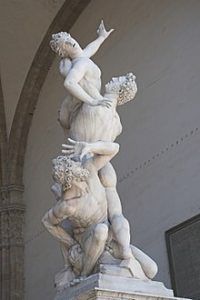
The Kidnapping of the Sabine Women by Giambologna. Quoted on stage in San Diego Opera’s “Rigoletto”. Maybe not in your great grandmother’s “Rigoletto”.
The set also has racy murals. Still, it’s a bit Victor Book of the Opera anyway.
Much of the retro scenic design by Robert Dahlstrom evokes the grand old days before Regietheater concepts ruled the world, so it looks like your great grandmother’s Rigoletto, as do the costumes from the Opéra Montréal. San Diego Opera has presented Rigoletto at least five times in the past, and I recall that one of them relocated the story to Hollywood. This was the brainchild of Bruce “Driving Miss Daisy” Beresford and had been offered earlier at the LA Opera. As I recall, San Diegans didn’t like it very much. But today outrageous stagings with nudity and simulated sex are common in this opera. The recent Met production sets the action in Las Vegas. The old ENO Jonathan Miller “mafia” Rigoletto plays out in New York City. So the San Diego Rigoletto won’t be making any headlines.
Things may tighten up for this show before Tuesday. Let’s hope so. It needs more oomph — and a tenor who’s feeling well.
Other performances of note include bass-baritone Scott Sikon’s resonant Count Monterone, the other wronged father of the drama; bass-baritone Kyle Albertson’s assassin Sparafucile, although the stage director could amp up his menace; and those performances of the other cast members listed below.
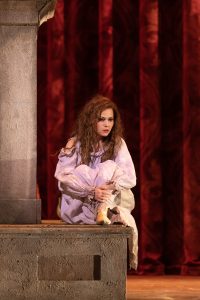
Soprano Alisa Jordheim is Gilda in San Diego Opera’s RIGOLETTO. February, 2019. Photo by Karli Cadel
CAST
Stephen Powell — Rigoletto
Alisa Jordheim — Gilda
Scott Quinn — Duke of Mantua
Alissa Anderson — Maddalena
Kyle Albertson — Sparafucile
Scott Sikon — Count Monterone
Colin Ramsey — Marullo
Shelby Condray — Count Ceprano
Humberto Borboa — Borsa
Eden Tremayne — Countess Ceprano
Sarah Nicole Carter — Giovanna
Tzytle Steinman — A Page
Steven White — Conductor
Michael Cavanagh — Director
PERFORMANCES
SAT, FEB 2 AT 7PM
TUE, FEB 5 AT 7PM
FRI, FEB 8 AT 7PM
SUN, FEB 10 AT 2PM
San Diego Civic Theatre
1100 Third Ave, San Diego, CA 92101

